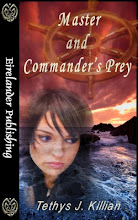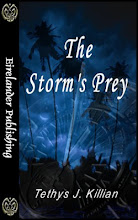I will come back and free you, Mom. I promise
Two classic lines. A defining moment.
There are aspects of characterization that are often lost beneath the multitude of words, heart stopping crisises, deeply desperate black moments and dramatic flair of a story. These moments have a name. They are called Impact Moments. It is in a glimpse of a character's movement, a line of dialog or the flash of emotion across a character's face that they change forever. In a way, they are fulfilling the authors destiny they've designed for them. Impact Moments don't have to be subtle, but normally are.
The opening lines of this blog post, 'I will come back and free you, Mom. I promise.', comes from Star Wars, The Phantom Menace. The young Aniken has won his freedom in the pod races. It is a moment in which success and freedom war within his young soul as he leaves all he knows and the only person who has ever shown him kindness—his mother—behind.
This sets up Aniken's entire personae through the remainder of the prequels. Why he does what he does rotates around one pivotal moment—the Impact Moment.
The premise of the Impact Moment is based in psychology. We develop in our pre-adolescent years much of who we are when we mature. Things that make little difference to an adult, can drastically effect a child. A comment from a teacher, a joke from a parent, praise or bullying are translated in a child's mind differently. Children are far more literal than adults give them credit.
In Aniken's case, the line, and the emotions that followed, defined him. He'd do anything to save his mother when she was captured by the Sand People. He failed. Return to the original line of dialog. Aniken's failure is the cataclysmic turning point in his life, but it is directly related to his Impact Moment.
From that scene forward, Aniken begins his tunnel-visioned walk to the Dark Side. His love for Padme, the fear he'll lose her, are all integral rungs as he descends into evil. He won't leave his wife, and, he can't stand the thought of her leaving him. It all rotates around the Impact Moment.
This is the importance of the Impact Moment. All characters, like all people have at least one. These are also the moments of back story used in a story, whether short or long. They are the definers of a character. The glue that sticks them to the story.
Every author, no matter what they write, should be able to spit out the character's Impact Moment without thought. What makes your character who they are? What happened in their past to put them on this path?
When you find that answer—you'll have your Impact Moment.
Hope this helps. If you have another way of defining a character, I'd love to hear it.
Until next time – cheers and happy writing,
T.J.





.jpg)
.jpg)






6 comments:
Wow...
From the first line of this essay I was hooked. You really helped me to *see* more clearly not just the importance of the Impact Moment but how to tune into that with my characters.
I'll be contemplating this for some time, I do believe. And considering with new eyes my WIP.
Thanks, Lee!
Smiles,
Chiron
What a useful post! You explain the impact momement clearly and fully. I like the Star Wars example too.
Great example. I'm going to have to think about this on the book I'm going to be revising.
Thanks a lot, Lee.
Huge hugs,
Sandy
Great comparison Lee. Considering we've been watching these movies (again-groan) with the boy, it's very easy to see the progression as he matures. Definitely worth thinking about.
Very good post, T.J. You explain it logically and in a concise manner.
Every author will tell you their character is who they are because of their backstory. True, but what most fail to grasp is that it is only one aspect of the backstory that shapes a person, and that's the impact moment. It's something that makes a lasting, indelible impression.
Way to go. Can't wait for more!
Hugs
Z(Aasiyah/Nolwynn)
As in normal life, there are only certain moments that define us. With me, sometimes it was a place I've seen, a major turning point in my life, even a dish I've eaten or a person I've met. For characters to be realistic, they must reflect us.
This is so well explained - I loved your chosen example, and I loved how you broke it down.
Thanks, Lee!
Post a Comment